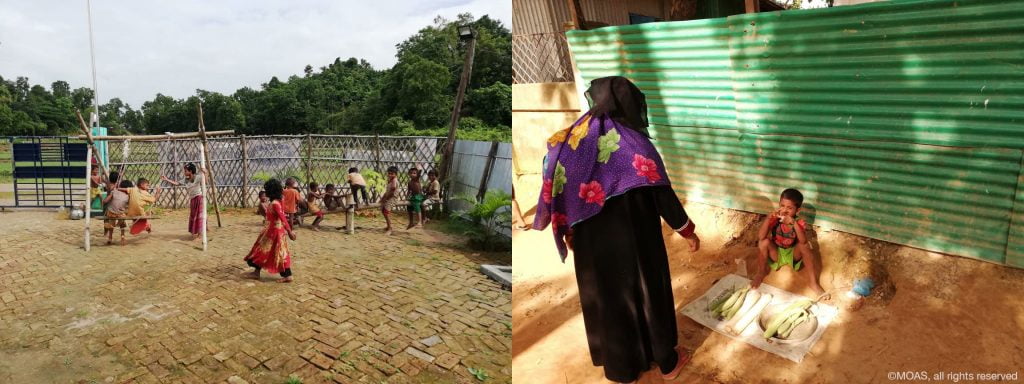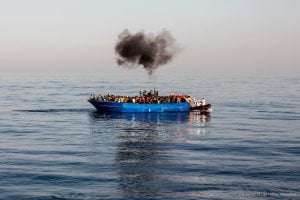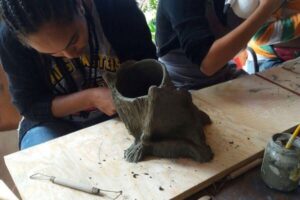A swing, a little girl dressed in red walking in front of an Aid Station, the smile of some children playing behind her, a boy waving goodbye. This picture – sent by the tireless MOAS team in Bangladesh – gives me hope. Finally, we receive good news to mitigate monsoon-related concerns and our concerns about not being able to reach everybody in need of medical assistance.
In a corner, there is a girl with her young brother. They sit on fruit boxes and hope to sell something to make some money. Some girls take care of their younger siblings, some others pose in front of someone willing to take a picture of her.
If we weren’t in a Rohingya settlement devastated by torrential rains, and those children weren’t highly traumatised, this could just be normal daily life in a city. Some men and women are also seen in a small market selling fruit and vegetables; some people pray, and others are trying to stabilise their shelters.

Since the very beginning, MOAS Aid Stations were conceived as oases of listening where people might find comfort and tranquillity to rest a bit, since life in the camps is always very busy. Later on, we created a small playground for Rohingya children, who represent up to 60% of the community as a whole. In less than one year, MOAS medical teams treated 75,000 patients, of which 40% are women and girls, and 44% are children. In Bangladesh there are currently 1.3 million people in extreme need of assistance, and only 33 health facilities providing vital healthcare, thus alleviating the suffering of both Rohingya and local host communities.
During my stays and thanks to the updates from the ground, I could appreciate the courage and inner strength of the Rohingya community that continues to cultivate hope. If I were asked to describe Rohingya attitude with one single word, I would use ‘resilience’. Rohingya people were abused in their country of birth, endured hellish journeys and adjusted to life in overcrowded camps, where they are greatly exposed to natural disasters during the monsoon season.
Many of the women that I have met survived violence and lost relatives and friends, who were brutally killed before their eyes. Nonetheless, they have never surrendered. Rohingya women continued to focus on their future and to protect the rest of their families. Additionally, they have never stopped asking for justice, and their claims intensified on the anniversary of their exodus from Myanmar into Bangladesh. According to AFP, on August 25th, one year after the beginning of Rohingya genocide, around 40,000 people participated in a protest to prevent similar violence from happening again. ‘Never Again’ was their main slogan.
At the same time, repatriation to Myanmar is under negotiation, and the Rohingya community in Bangladesh has different views. Some people would go back immediately to Myanmar, some would go only after having their rights safeguarded (preferably with international organisations monitoring the situation), and some others would never return because they fear they will end up again in the same cycle of marginalisation.
Last May, Xchange issued a survey after interviewing Rohingya women and men about repatriation: 99% would return to Myanmar under certain conditions, whereas five respondents would be willing to go back in any case. The requested conditions would include the acknowledgment of Rohingya citizenship, respect of their rights and freedoms, including the right to move freely and to profess and practice their religion.
Life in overcrowded refugee camps or makeshift settlements without adequate facilities is hard everywhere, but the situation is even worse for the Rohingya refugees in light of their statelessness that puts at stake the future of entire generations. Last August, Human Rights Watch documented how six Rohingya people were victims of violence upon their return to Myanmar from Bangladesh. Allegedly, they were violently interrogated to force them to confess to an affiliation with ARSA. My fear is that we will make the same mistake that we denounced in the Med and Aegean.
I am concerned that again we will talk about the Rohingya, but nobody will talk to them to understand their legitimate fears and seeking of justice. Only if their claims are taken into account and their rights safeguarded, Rohingya will be able to return to their country of origin. But, if we fail entire generations of Rohingya looking for peace, we won’t just be terribly unfair to them, but we will demonstrate the inability of the international community to comply with the existing conventions and treaties aimed to protect the most vulnerable.



